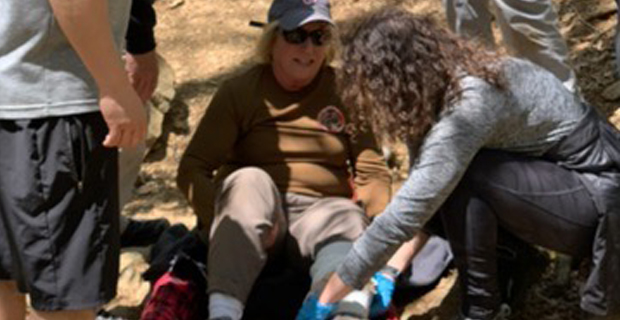By B.L. Wilson
A sunny, cool day on the White Oak Canyon Trail in the Shenandoah National Park going up a steep incline to the waterfalls was somewhat strenuous, said Anna Jones, beautiful but uneventful for her husband and other hikers. They stopped for lunch and to take in the view before heading downhill a half hour later, stepping carefully over the wet rocks.
“I slipped on a wet rock that also had a little bit of teeter totter in it that caused me to lose my balance, and I came crashing down on my left foot,” Jones said. “I knew immediately. I’ve never broken anything, but the pain was intense and when you looked at the foot, it was like something was just dangling.”
Her husband tried to create a splint using branches and with help from a fellow hiker tried to carry her as she clung to their shoulders.
“It is such an uneven terrain, with all those rocks as you’re going down,” Jones said. “That was not going to work.”
They stopped, still two miles from the trail head. They tried to consider alternatives. That’s when along came Brittany Bohn and Jose Garcia, students in the George Washington University School of Nursing’s bachelor of science in nursing veterans option. They had been out for a wellness day in the woods.
“We were coming up the trail really close to the waterfalls, scrambling up wet rocks,” Bohn said, “when I saw a woman about my mom’s age on the trail, sitting down. Her foot was extended, and I saw that it was obviously misconfigured. It wasn’t just a twist. It was much more serious.”
Bohn and Garcia explained that they were nursing students at GW with prior military experience and offered to help. The Joneses readily accepted, and Bohn began asking whether she had any chronic health issues, what her pain level was and to examine the foot that was covered by a sock.
“We knew from nursing school that when you have a break like that you need to relieve the swelling,” said Bohn. “Otherwise, it could become a serious threat to the limb extremity if circulation is lost. I recommended that we cut off her shoe.” Luckily, the one tool Bohn had brought with her, she said, was a Swiss Army knife.
The area had no cell phone coverage. So, Garcia suggested they try a “fire man” carry, four of them taking turns to form a kind of chair. It was slow going, but they knew they had to get her off the trail and somewhere quick to receive medical attention.
At that moment, they crossed paths with an REI scouting crew who were equipped with scissors, gauze and soft pliable splints that were much better than the jagged tree limbs they were using.
As the REI crew replaced the splint, Garcia came up with an idea he had learned in the Marine Corps of making a stretcher using two sturdy tree limbs that could be put through the arms of jackets and shirts to make a bed for the injured person to lay on more comfortably. Many of them had jackets because of the cool temperature.
“I was the test dummy,” said Bohn. “The last thing we wanted was to have this great idea and put Anna on the stretcher, she falls and is further injured.”
The group took turns carrying the stretcher and were able to move without stopping in a kind of relay. “Someone would shout, ‘Back left or front right,’ Bohn said, “and someone would go to them to do a relay hand off.”
Garcia said that as they made their way back down the trail, he noticed the broken foot swelling was worsening, and Jones “barely had any sensation” in the foot
“I will just never forget how physically fit and mentally tough Anna Jones was,” Garcia said. “She didn’t complain once and was still joking more than an hour into the ordeal even though I could tell her adrenalin was wearing out.”
A passerby had dashed ahead to call emergency medical services who were waiting when they got to the trail’s parking area. She was whisked away to the University of Virginia Hospital, where Jones said a doctor told her, “’Ma’am, at this point, we’re just hoping we can save your foot.’ I looked and I could see it had turned a terrible color.”
Jones said the friends she was hiking with are in great shape, as is her husband, a former Marine. “But 60 years old is a big difference in strength, stamina and everything, balance. These 30-year-olds—it was nice to get that energized feeling from these people who had a nursing background and knew I needed help right away.”
“Brittany and Jose were complete strangers,” Jones said, “They were trail angels. I will forever be thankful, grateful.”


